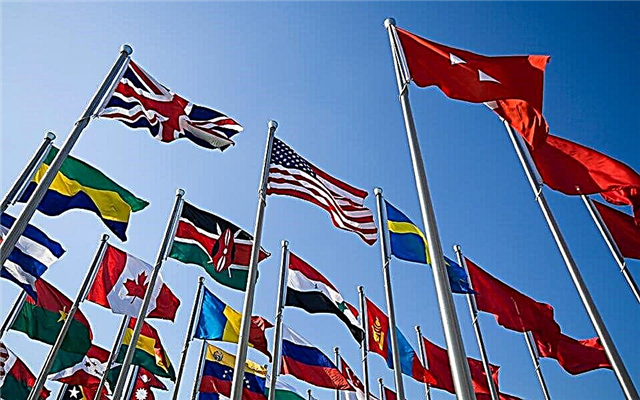The real "nightmare before Christmas" was arranged for its readers by Bloomberg. It amounted to 2019 global threat rating. Not the New Year’s topic, frankly, but as they say, whoever is warned is armed.
8. Trade wars
 The first challenge to the global economy in 2019 is the U.S.-China Trade War, which has slowed down the growth rates and macroeconomic indicators of China and the Eurozone. Even the US economy, which this year exceeded all expectations, is likely to suffer in the future. In an interview with the Wall Street Journal, Maurice Obstfeld, chief economist at the International Monetary Fund (IMF), predicted that US economic growth would slow in 2019, as weakening economic performance in Asia and Europe threatened to negatively impact the US economy.
The first challenge to the global economy in 2019 is the U.S.-China Trade War, which has slowed down the growth rates and macroeconomic indicators of China and the Eurozone. Even the US economy, which this year exceeded all expectations, is likely to suffer in the future. In an interview with the Wall Street Journal, Maurice Obstfeld, chief economist at the International Monetary Fund (IMF), predicted that US economic growth would slow in 2019, as weakening economic performance in Asia and Europe threatened to negatively impact the US economy.
The Organization for Economic Co-operation and Development (OECD) recently changed its forecast for global economic growth in 2019, condemning the fierce trade war between the US and China as the “main culprit”. In its latest economic outlook report, the OECD said global economic growth in 2019 is expected to increase by 3.5%, compared with a forecast of 3.7% released in September. Although the US and China have temporarily “reconciled” in recent days, most analysts said their trade standoff will continue next year.
7. Brexit
 The process of UK exit from the EU (Brexit) is currently "stalled" in the British Parliament. Many members of the ruling party, as well as representatives of Her Majesty's opposition, have protested against the Brexit agreement that the UK government recently concluded with the EU.
The process of UK exit from the EU (Brexit) is currently "stalled" in the British Parliament. Many members of the ruling party, as well as representatives of Her Majesty's opposition, have protested against the Brexit agreement that the UK government recently concluded with the EU.
If the British Parliament refuses this agreement, a political crisis may begin in the country. According to Bloomberg, the “complex” scenario mentioned above could lead to a 7% decline in UK GDP by 2030 compared to when it was still an EU member. If such an unexpected scenario does occur, it will have a negative impact on the global economy in the new year.
6. The crisis in Italy
 The 2019 ranking of the main dangers includes a contradiction between the Italian government and the EU. Rome has too much expense. In its annual review of the budget plans of the Eurozone countries, the European Commission said that Italy’s budget “is not particularly in line” with the restrictions set by the EU.
The 2019 ranking of the main dangers includes a contradiction between the Italian government and the EU. Rome has too much expense. In its annual review of the budget plans of the Eurozone countries, the European Commission said that Italy’s budget “is not particularly in line” with the restrictions set by the EU.
However, the Italian government has still not succumbed to EU requirements for budget plans. This conflict made investors and EU officials feel insecure and worry that Italy would cause a new financial crisis in Europe next year.
5. Political crisis in the USA
 Opens the top 5 global risks in 2019, the country of a victorious democracy, and specifically, the Democrats, who took control of the US House of Representatives during the recent midterm elections. It is possible they will begin to “put sticks in the wheels” of Donald Trump and his team. There is an option that this confrontation may end in impeachment of Trump.
Opens the top 5 global risks in 2019, the country of a victorious democracy, and specifically, the Democrats, who took control of the US House of Representatives during the recent midterm elections. It is possible they will begin to “put sticks in the wheels” of Donald Trump and his team. There is an option that this confrontation may end in impeachment of Trump.
4. Elections
 2019 will be the time of elections in some countries with rapidly developing market economies (in particular, Indonesia, India and Argentina). And this threatens to negatively affect the global economy due to the growing influence of populist politicians. This has already happened in Brazil, where Jair Bolsonar, nicknamed Tropical Trump, came to power.
2019 will be the time of elections in some countries with rapidly developing market economies (in particular, Indonesia, India and Argentina). And this threatens to negatively affect the global economy due to the growing influence of populist politicians. This has already happened in Brazil, where Jair Bolsonar, nicknamed Tropical Trump, came to power.
3. Oil
 In 2019, Middle Eastern policy will be given increased attention, especially US relations with Iran and Saudi Arabia, as well as relations between OPEC and its allies.
In 2019, Middle Eastern policy will be given increased attention, especially US relations with Iran and Saudi Arabia, as well as relations between OPEC and its allies.
Political tensions are growing between members of the Gulf Cooperation Council in connection with a boycott of Qatar led by Saudi Arabia. This could potentially undermine the willingness of OPEC countries to work together to balance the oil market.
If the strategy to reduce oil production by OPEC participants is revised, approximately 1.8 million barrels of “black gold” per day will return to the market. This will lead to a collapse in prices (but not for gasoline in Russia).

Although this will also lead to slightly higher fuel consumption, prices can still return to their previous minimum values (around $ 40 per barrel). Cheaper oil will support economic activity in countries that rely heavily on energy imports or energy-intensive industries.
But countries that are heavily dependent on oil exports - above all, the Gulf countries, as well as Russia, West Africa and some Latin American countries - will suffer severely economically. Developing countries, including Nigeria and Angola, will face serious debt problems, as well as possibly political and social instability.
2. Waterways in East Asia
 North Korea and the United States temporarily stopped figuring out which of them is the coolest globally. This gave America the opportunity to focus on the disputed South China Sea. She conducted exercises in the Philippines, with the participation of two naval strike groups and involving about 150 carrier-based aircraft.
North Korea and the United States temporarily stopped figuring out which of them is the coolest globally. This gave America the opportunity to focus on the disputed South China Sea. She conducted exercises in the Philippines, with the participation of two naval strike groups and involving about 150 carrier-based aircraft.
Such a demonstration of power by the United States cannot but worry China. It is unlikely that this will come to an open military clash, but this clearly will not improve the strained relations between the stronghold of world democracy and the Celestial Empire.
And concerns about how China intends to use its ever-expanding capabilities in support of territorial and maritime claims may prompt other countries to confront it politically, despite the country's economic weight.
1. Terrorism
 The biggest risk to humanity in 2019, according to Bloobmerg experts, is not related to a specific country. Terror is terrible in that it threatens people in different states. According to Robert Niblett, head of the British analytical center Chatham House, the terrorist attack can take any form, including cybernetic.
The biggest risk to humanity in 2019, according to Bloobmerg experts, is not related to a specific country. Terror is terrible in that it threatens people in different states. According to Robert Niblett, head of the British analytical center Chatham House, the terrorist attack can take any form, including cybernetic.
A large-scale incident can have the most dire consequences for the global economy, since the reaction of the government of the affected country will be unpredictable.
Last year, according to the National University of Maryland Terrorism Consortium, 26,400 people died from terrorist attacks around the world.












